Race, Sexuality, Dispossession, Dead-End Liasons — The Stuff of Life
Life writing is a broad church. Gone are the days when you could pick up any book classified under biography or memoir and expect to find a linear narrative spanning from birth through old age. The books we feature here represent a huge variety, encompassing everything from a two-week travel notebook to a set of personal essays reflecting on race and sexuality. We also have a trio of oral histories from Syrian refugees, an extended letter to a lost child, the story of a long-ago love affair with a celebrated American poet, an Afghan family memoir, and an account of a swimming challenge undertaken to overcome depression. All these authors are consummate storytellers looking for the crucial moments that define a life.
Crossing the River Kabul
An Afghan Family Odyssey
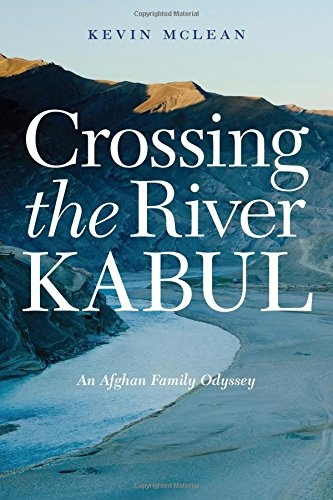
Kevin McLean
Potomac Books
Hardcover $29.95 (256pp)
978-1-61234-897-1
Buy: Amazon
Baryalai “Bari” Popal fled his native Afghanistan in 1980 after the Soviet occupation and only returned after the Taliban was ousted in 2002. The result of ten years of collaboration, lawyer Kevin McLean’s Crossing the River Kabul: An Afghan Family Odyssey narrates the shifts in Popal’s family fortunes and follows him from Afghanistan to Germany to the United States, and finally back home.
Popal and his family descend from the Popalzai, one of Afghanistan’s two royal families, and over the decades they have held great political influence. However, the country has frequently changed hands and allegiances, and the Popals have not always been on the “right” side of history. Whereas Bari’s grandfather was exiled by the “Iron Amir” in the late 1800s, his father, Abdul Rahman Popal (simply called “Baba”), served in the country’s foreign ministry, and Uncle Ali was the ambassador to Japan.
During the time that Popal was a student at Kabul University, the Communists came to power. He refused to register with the military and would hide in the chimney crawl space whenever National Security guards came looking for him. In 1980, he and a cousin finally escaped the country via Pakistan. Family connections rescued him more than once, and after a decade in Aachen, Germany, he got his longed-for chance to move his family to America. He purchased a SpeeDee Oil franchise in San Diego, California, in 1992 and became a US citizen in 2002.
McLean writes from Popal’s perspective, delivering a convincing first-person narrative attuned to local speech: “nay” fills in for “no,” and Popal remembers “a pomegranate sunrise.” Photographs plus details of meals and clothing lend authenticity, while scenes like falling in love with Afsana, his future wife, convey the intimacy expected from an autobiography. The book gives a keen sense of Afghanistan’s volatile history throughout the twentieth century and up to the present, especially as Popal makes return trips to Kabul starting in 2002 and reclaims his home, which had been taken over by drug lords. Now he admits to the exile’s split loyalties: “my heart is in two places—California and Afghanistan.”
REBECCA FOSTER (June 29, 2017)
Floating
A Life Regained
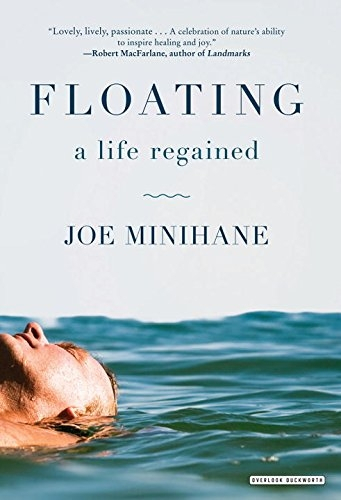
Joe Minihane
The Overlook Press
Hardcover $28.95 (272pp)
978-1-4683-1492-2
Buy: Amazon
After Joe Minihane quit his journalism job to go freelance, he soon found himself having to write dull technology stories, all along wishing he could be a travel writer instead. He was in a state of constant anxiety about finances, which provoked feelings of being a failure.
In 2010, he took up wild swimming, mostly in England’s ponds and rivers, as a way to train himself to stay in the moment and quiet his mind; “I swam to fix myself,” he recalls. In Floating: A Life Regained, he recounts how, over the course of two and a half years, he battled depression by reprising the outdoor swimming challenges undertaken by his hero, the late English nature/travel writer Roger Deakin, in Waterlog, which here becomes a kind of sacred text. Minihane first documented the journey on his Waterlog Reswum blog.
Whereas Deakin had a moat at his Elizabethan farmhouse in Suffolk to use as a daily practice site, Minihane had London’s Hampstead Ponds. Neither a naturalist nor a strong swimmer, he was perhaps not an obvious candidate to recreate Deakin’s feats. Since he didn’t drive, he caught rides with fellow swimmers or prioritized sites near train stations. Outdoor swimming always brought its fair share of worries, like a dread of nibbling fish or “the tortuous task of disrobing” in out-of-season cold. Worse, his bicycle was once struck by an SUV, and he couldn’t swim while he waited for his broken wrist to heal.
The book is many things: a quest narrative, an atmospheric travel book ranging from the Yorkshire Dales to the Scilly Isles, and a record of psychic transformation. Minihane calls it “part homage, part personal mission to find my own place in Roger’s tale.” That habit of referring to Deakin chummily as “Roger” somewhat grates, but it emphasizes the author’s sense of intimate connection with the mind behind Waterlog.
Clearly this is about more than just swimming; it’s about finding what produces fulfillment and camaraderie. “As much as being in the water is about escape,” Minihane writes, “it is also about joy. Sharing swims like this made me happy.”
REBECCA FOSTER (June 29, 2017)
Live Through This
Surviving the Intersections of Sexuality, God, and Race
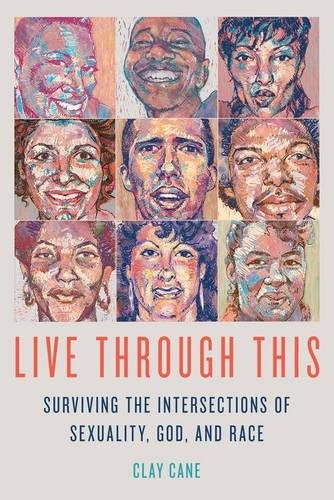
Clay Cane
Cleis Press
Softcover $16.95 (216pp)
978-1-62778-218-0
Buy: Amazon
Clay Cane can’t forget the first time he was called a “faggot.” Aged seven, he’d dressed up in his mother’s clothes and makeup; her boyfriend called him gay. Cane’s mother kicked the boyfriend out for good, and “that one moment of affirmation armored me for life,” Cane recalls. In Live through This, a hard-hitting collection of autobiographical essays, he spotlights moments that cemented his identity as a gay black man and explains how he defines himself in relation to pop culture and the black church.
Thematic rather than chronological, these pieces keep circling back to turning points in the author’s life, like the poverty and bullying he experienced in Washington with his mother, or finding his tribe of fellow LGBTQ+ teenagers when he joined his father in Philadelphia.
Dialogue and vocabulary are raw yet believable. One essay tells how Cane learned to debate from trans sex workers in Philly; in another he vividly recounts how a drug dealer boyfriend forced him to fellate a white client in a club. “I had to live through this to make it out on the other side,” he remembers thinking.
Explicit scenes are only one source of controversy here. In his 2015 BET documentary, Holler If You Hear Me, the author accused closeted “church queens” like gospel singer Donnie McClurkin and the late Bishop Eddie Long of being complicit with homophobia. Cane also rejects “mixed” and “biracial” labels, preferring to think of himself as simply black, although his mother is white. His basic criterion is “‘Do you or do you not have white privilege?’ If you don’t, then you are a black person in America.”
The title’s language of endurance in the face of persecution resonates widely: striving not to repeat family patterns of violence and misogyny, living with the fear of contracting HIV, and resisting the subtle homophobia kept alive by hip-hop music and celebrity culture. Whether competing at a drag queen ball or interviewing gay icons like Mary J. Blige in his role as a journalist, Cane’s gaze is unflinching. “This is my manhood. My story,” he declares.
REBECCA FOSTER (June 29, 2017)
Our Israeli Diary
Of That Time, Of That Place
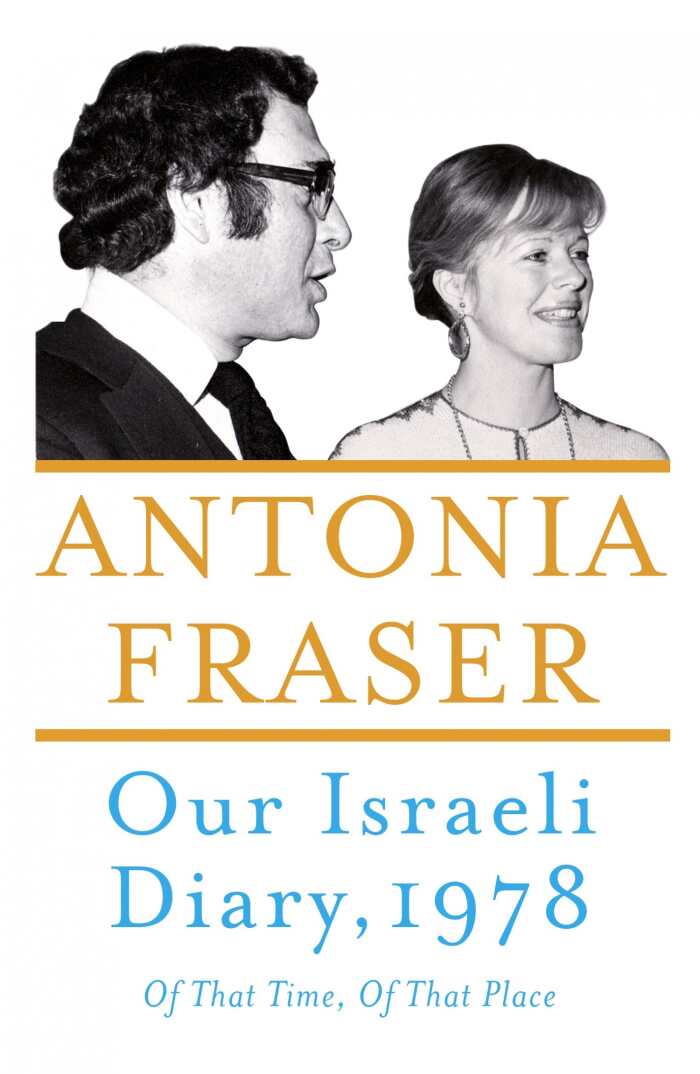
Antonia Fraser
Oneworld Publications
Hardcover $16.99 (176pp)
978-1-78607-153-8
Buy: Amazon
In 1975, British biographer Antonia Fraser caused a scandal by leaving her husband for Jewish playwright Harold Pinter, whom she did not marry until 1980. Like Joan Didion’s recent South and West, Fraser’s Our Israeli Diary is less a polished narrative than a working notebook, in this case of a jam-packed two-week tour in May 1978. She found the typewritten document “by chance \[while\] clearing out an old cupboard,” and it is presented as is, abbreviations and all, though with added photographs.
It was a first visit for both Fraser and Pinter, so they strived to see all that the country had to offer, including mosques, kibbutzim, the Wailing Wall, the Dead Sea, the Church of the Holy Sepulcher, Bethlehem, and the Knesset. One particular highlight was Masada, a rock fortress reached by cable car. She evocatively describes the 110-degree heat: “the desert is fierce, hot and predatory, the verdant oasis of Jericho all the more remarkable.” They also discuss how Fraser will depict sand dunes in her diary, a reminder that, though it seeks to convey immediate impressions, this is still very much a constructed document.
Although Fraser acknowledges her ignorance of Jewish history and Hebrew characters—of their apartment number she says, “We memorise ours, which I describe as Sideways Dustbin”—she is eager to rectify this through her reading. She’d read Saul Bellow’s book on Israel as preparation, and she buys biographies of Prime Ministers Menachem Begin and Golda Meir, who’d resigned in 1974. There’s only one breathtakingly insensitive moment in the diary: when Fraser likens her allergic skin blotches to persistent Palestinian terrorists.
In addition to their sightseeing, the couple fits in plenty of socializing—dinners, concerts, receptions, and a meeting with opposition leader Shimon Peres. It’s no wonder Fraser later confesses that “heat and strain and meeting people are getting to me.” Her last entry makes for a sudden ending; it’s a shame she didn’t add an epilogue reflecting on what has changed and what remains true. Nevertheless, this serves as both a tribute to the late Pinter and a snapshot of Israel forty years ago.
REBECCA FOSTER (June 29, 2017)
Loving Robert Lowell
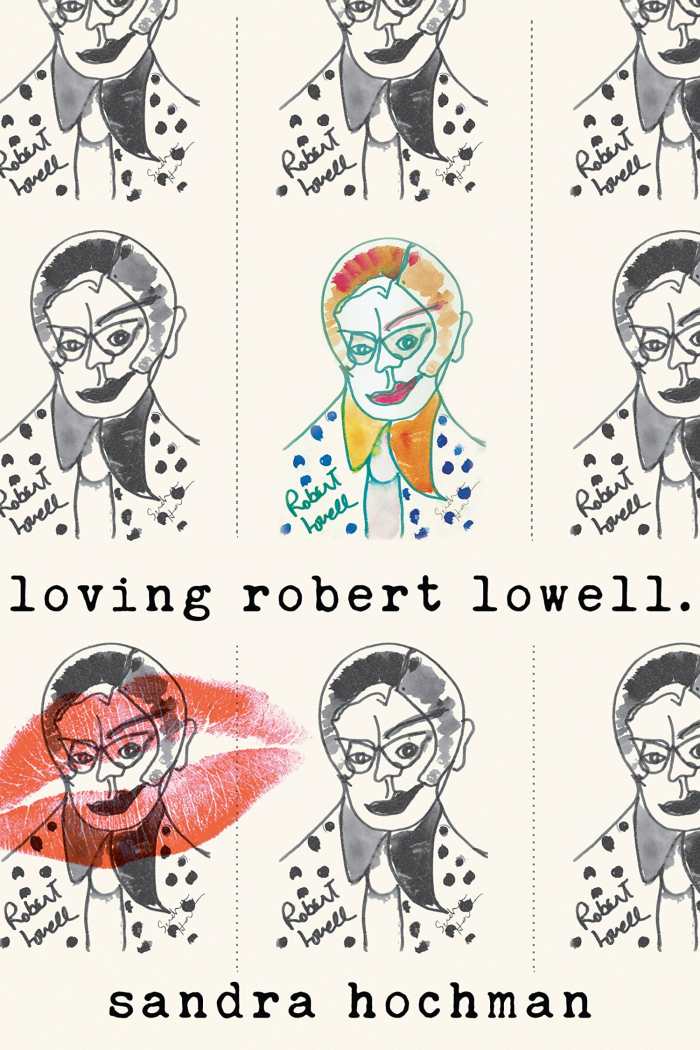
Sandra Hochman
Turner Publishing
Softcover $16.99 (256pp)
978-1-68336-537-2
Buy: Local Bookstore (Bookshop), Amazon
In 1961, twentysomething Sandra Hochman interviewed forty-three-year-old poet Robert Lowell for Encounter magazine. Lowell agreed to meet her—just a half hour after their telephone call—at a New York City tea room and was immediately friendly and flirtatious. He confided that he was leaving his second wife, Elizabeth Hardwick, and believed Hochman would be the perfect person to start over with. Amid the spring snow on Brooklyn Bridge, he vowed to marry her. Hochman was drawn to Lowell’s impulsiveness and charisma. At the time, she was also separated from her husband, violinist Ivry Gitlis. Was this a coup de foudre or a disaster waiting to happen?
In Loving Robert Lowell, Hochman, a novelist and journalist, recalls the euphoria and cruel letdown of her months-long affair with the man she, like many, called “Cal,” a childhood nickname likening him to the tyrant Caligula. Lowell’s past—a Catholic upbringing in a prominent Boston family, being a wartime conscientious objector, and a first marriage to novelist Jean Stafford—emerges through their recreated conversations, while Hochman fills in her own history through flashbacks.
It’s in capturing the fevered pace and heightened emotion of their liaison that the book shines. A budding poet, Hochman was thrilled to have the undivided attention of her literary hero. They read and commented on each other’s poems (examples of which are quoted here at length), attended mass and held a seder to understand their respective faith traditions, and shared their hobbies. “We were two dream pickers trying to fit the jigsaw of our own lives together in a new puzzle,” Hochman remembers.
Woven through this glistening picture of fresh love, however, are seeds of doubt. Despite the warnings, it comes as a shock to the reader as much as to Hochman herself when Lowell has a manic episode at their engagement party, tries to choke her, and gets taken away in a straitjacket. The true extent of Lowell’s mental illness, unknown to her before, was suddenly clear. “I ended our love affair in a mental ward,” she laments, yet the bittersweet conclusion can’t outweigh the innocent beauty of what went before.
REBECCA FOSTER (June 29, 2017)
Beyond the High Blue Air
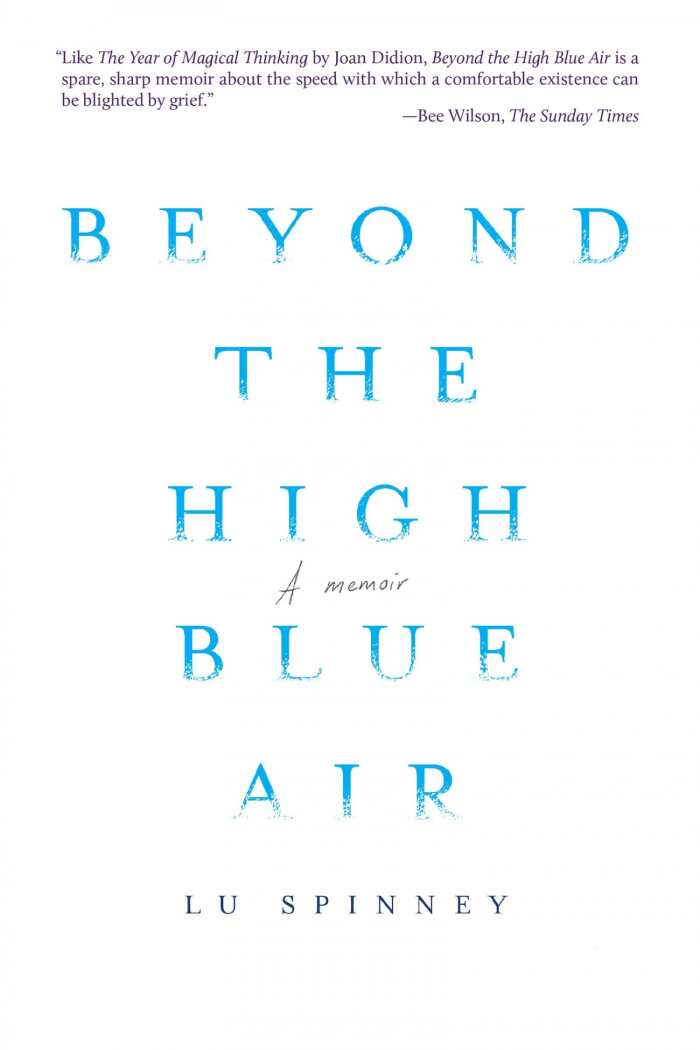
Lu Spinney
Catapult
Softcover $16.95 (262pp)
978-1-936787-54-8
Buy: Local Bookstore (Bookshop), Amazon
In Beyond the High Blue Air, Lu Spinney confronts every mother’s worst nightmare and boldly searches the meaning of life and death.
Spinney’s adult son Miles suffers a snowboard accident that leaves him in a “minimally conscious state.” She, and her whole family, become dedicated to his care. But as the years progress, everyone, including Miles, begins to wonder if this is what life should be. Together, they painfully yet hopefully seek a peaceful, humane way to end Miles’s life, but since he’s not in a “persistent vegetative state,” their wishes aren’t allowed medically or legally. The result is a highly individual story with implications for the field of medicine and law, and for the whole of humanity.
Spinney’s bold, honest narration is raw with nearly every emotion. She generously opens up her family’s trauma and tenderness, holding nothing back as she pays tribute to her son and begs for a better way for mothers, lawyers and doctors, and humanity to honor life and accept death.
The book showcases ethical questions like assisted death and quality of life clearly and directly, without pontificating; Spinney lets the story speak for itself. While Spinney and her family sought a way to end Miles’s life, their story ultimately upholds human dignity and the full joy of being alive.
In the end, Miles’s death was not what they’d hoped for: a respiratory infection robbed the family of the peaceful end they wanted. And Spinney found, all too painfully, that even a longed-for death comes with crushing grief.
Her story is compelling to families facing choices for the quality of life of loved ones, and for medical and legal professionals as they grapple with what it means to save a life and who has the right to end it.
Beyond the High Blue Air explores the limits of medical science and searches for the unlimited potential of human compassion.
MELISSA WUSKE (June 29, 2017)
We Are Syrians
Three Generations, Three Dissidents
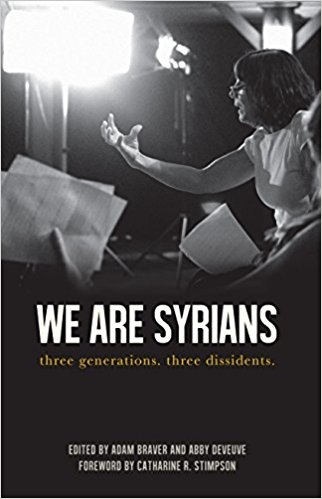
Adam Braver, editor
Abby Deveuve, editor
University of New Orleans Press
Softcover $18.95 (200pp)
978-1-60801-133-9
Buy: Local Bookstore (Bookshop), Amazon
The fourth book in the Broken Silence series, We Are Syrians (edited by Roger Williams University’s Adam Braver and Abby Deveuve) is a composite oral history of a half century of Assad family leadership. Formed of first-person narratives compiled from interviews with three Syrians who now reside in the United States, the book traces the country’s descent into authoritarian rule.
Naila Al-Atrash joined the Communist Party, which funded her theatre studies in Bulgaria, as a teenager. When she returned to Syria in 1978, government officials attended her Damascus National Theater production of Night of the Slaves, which was subsequently banned for its political message. After years of teaching and supporting pro-democracy movements, during which she was fired and kept under house arrest, Al-Atrash fled Syria via the Scholars at Risk program.
In the 1990s, Radwan Ziadeh educated himself about events airbrushed from Syrian history—like the Hama massacre—and wrote books and articles about human rights in Arab countries. Especially after helping form the Damascus Declaration for Democratic Change, he was frequently interrogated by security agents. When he left Syria for good in 2007, a warrant was issued for his arrest if he ever returned.
Unlike the others, Sana Mustafa was not forced to leave Syria due to dissident activities. When she and her sister were briefly arrested after participating in a 2011 demonstration, it only made it “clearer to us what we were fighting against,” Mustafa says. After a fellowship in the United States via the Middle East Partnership Initiative, she applied for asylum to remain. Today she is uncertain whether her imprisoned father is alive, while the rest of her family resides in Turkey.
As if coincidentally, these three stories fit together to provide a full, chronological account of the repressive Assad reign and citizens’ efforts to advance democracy. The editors wisely let their subjects’ stories speak for themselves; apart from an introduction, they make negligible interruptions in the text. Especially under the current American administration, it’s more important than ever to understand refugees’ experiences. This compelling, clear-eyed book should help ordinary Americans to empathize with the plight of Syrians today.
REBECCA FOSTER (June 29, 2017)
Ars Botanica
A Field Guide

Tim Taranto
Curbside Splendor
Softcover $14.95 (185pp)
978-1-940430-98-0
Buy: Amazon
Writing to one’s unborn child is reasonably common; it’s the starting point for Karl Ove Knausgaard’s upcoming quartet, for instance. Such a project might suggest romanticized anticipation, but Little Village managing editor Tim Taranto’s Ars Botanica: A Field Guide is completely different. Not only is his genre-busting volume addressed to an aborted fetus (“Catalpa”), but it intersperses short letters with narrative chapters, black-and-white photographs, and sketches of an unusual selection of flora, fauna, and fossils.
It all starts with a bicycle ride to a raptor rehabilitation center in Iowa. Taranto and his girlfriend had been together just two months, yet when a van ran her bike off the road that day, catapulting her into a tree and breaking her shoulder and collarbone, emergency-room staff discovered that she was already three weeks pregnant. This girlfriend—who’s never named, just referred to as “her” or “your mother”—swiftly decided to terminate the pregnancy at nine weeks; to Taranto’s dismay, she also ended their relationship soon thereafter.
The book is thus a dual elegy for a love affair cut short and a potential life never lived. With the letters to Catalpa and the images of natural relicts, the author is introducing this unborn child to everything it will never know: not only its parents, but also the beauty of the world. To that end, Taranto includes lots of sensory detail and many striking metaphors: “The peaks materialized in mauve clots upon the bolts of indigo and violet” of the sky, and “She’s run these trails for years … familiar to her as the melodies of old hymns.”
Although this is by no means a simple autobiography, Taranto does document the changes in himself brought about by losing his partner and Catalpa: an autoimmune condition caused him to start losing his hair and nails, and he got more involved in Quaker meetings and developed a new spiritual awareness. This is represented in the mixture of visions and dreams that populate the book’s latter half. Catalpa is like the resident ghost that haunts this peculiar memoir, a reminder that something doesn’t have to last to be precious.
REBECCA FOSTER (June 29, 2017)
Rebecca Foster

